

Bristol Festival of Ideas. Not quite 100 ways for Scientists to Engage in Social Media. Last night at a post lecture drinks reception I got into talking about using twitter as a scientist, and an academic, and thinking about what is in science communication for the communicator.
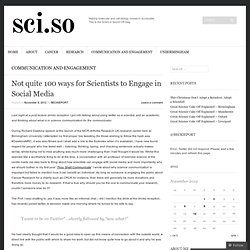
During Richard Dawkins speech at the launch of the MCR-Arthritis Research UK research centre here at Birmingham University I attempted my first proper live tweeting (for those wishing to follow the hash was #DawkinsMRC, it was also filmed and I shall add a link to the footnotes when it’s available). I have new found respect for people who live tweet well – listening, thinking, typing, and checking sentences actually makes sense, whilst trying not to miss anything was much more challenging than I had thought it would be.
Whilst this seemed like a worthwhile thing to do at the time, a conversation with an professor of exercise science at the centre made me step back to thing about how scientists can engage with social media and more importantly why we should bother. Making an impact: when science and politics collide. Under new plans, university departments will have to submit impact statements for researchers.
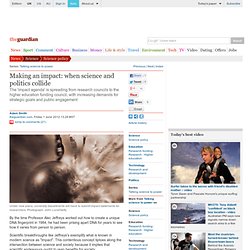
Photograph: John Lund/Getty By the time Professor Alec Jeffreys worked out how to create a unique DNA fingerprint in 1984, he had been prising apart DNA for years to see how it varies from person to person. Scientific breakthroughs like Jeffreys's exemplify what is known in modern science as "impact". This contentious concept tiptoes along the intersection between science and society because it implies that scientific endeavours ought to reap benefits for society.
Indigestible Committee Paperwork. Each summer it is standard for publications to produce lists of exam howlers to remind us just how woefully ignorant some of our students are at all levels.
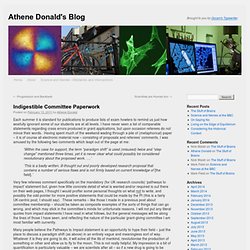
I have never seen a list of comparable statements regarding crass errors produced in grant applications, but upon occasion referees do not mince their words. Ripping yarns. "Egad!

" cried Professor Lackwind. "This wasn't the impact I had in mind! " "Impact" has had a bad press from many working in higher education. Guest Editorial: It's Time To e-Volve: Taking Responsibility for Science Communication in a Digital Age. Now, more than ever, science is fundamentally intertwined with national and international political issues, yet less than one-third of Americans can pass a science literacy test with questions like “Does the Earth revolve around the sun?”
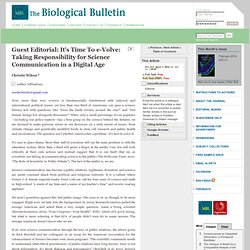
And “Did human beings live alongside dinosaurs?” When only a small percentage of our populace—including our policy-makers—has a firm grasp on the science behind the debates, we are doomed to make grievous errors in our decisions on a wide variety of issues, from climate change and genetically modified foods to stem cell research and public health and vaccinations. The question isn't whether America has a problem—it's how to solve it. A small treasure box of essays on social media and health from NEJM « Public Health Science Communication 2.0.
Once again, Twitter uncovered for me a s mall treasure box on the web.
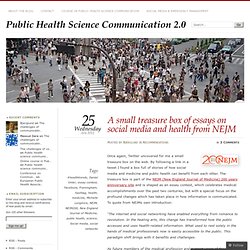
By following a link in a tweet I found a box full of stories of how social media and medicine and public health can benefit from each other. The treasure box is part of the NEJM (New England Journal of Medicine) 200 years anniversary site and is shaped as an essay contest, which celebrates medical accomplishments over the past two centuries, but with a special focus on the profound changes which has taken place in how information is communicated. Engaging with Parliament; A How to Guide. Dr Matthew Flinders is Professor of Politics at the University of Sheffield.
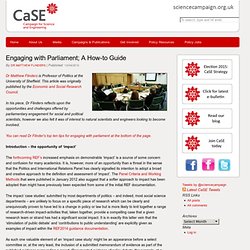
This article was originally published by the Economic and Social Research Council. In his piece, Dr Flinders reflects upon the opportunities and challenges offered by parliamentary engagement for social and political scientists, however we also felt it was of interest to natural scientists and engineers looking to become involved. My plan to create a really strong impact story - Adventures in Career Development. Making a difference: How can we demonstrate the impact of learning technology research? Research Fundermentals: REF: a Few Thoughts on Drafting Impact Case Studies. Museums, libraries and archives - learning - Generic Learning Outcomes. Mix and match to demonstrate impact The Generic Learning Outcomes are underpinned by a broad definition of learning which identifies benefits that people gain from interacting with museums, libraries and archives.
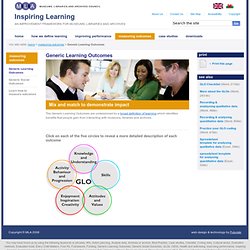
Click on each of the five circles to reveal a more detailed description of each outcome Knowledge & Understanding Knowing what or about something Learning facts or information Making sense of something Deepening understanding How museums, libraries and archives operate Making links and relationships between things Activity, Behaviour & Progression What people do What people intend to do What people have done Reported or observed actions A change in the way people manage their lives Skills Knowing how to do something Being able to do new things Intellectual skills Information management skills Social skills Communication skills Physical skills Enjoyment, Inspiration, Creativity Attitudes & Values.
National Co-ordinating Centre for Public Engagement. Section: Skills & knowledge When the Government invest in research, it is with the understanding that excellent research contributes to the economy, culture and social wellbeing of society; that it makes a difference.
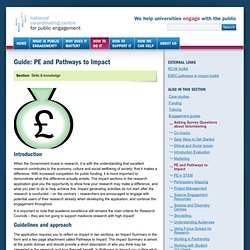
Economy boosted by University creativity. A new study shows that Scotland’s economy benefits significantly from the University’s commercialisation work.
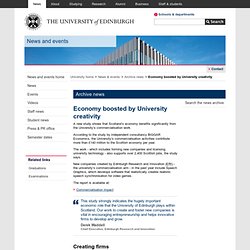
According to the study by independent consultancy BiGGAR Economics, the University’s commercialisation activities contribute more than £140 million to the Scottish economy per year. The work - which includes forming new companies and licensing university technology - also supports over 2,400 Scottish jobs, the study says. New companies created by Edinburgh Research and Innovation (ERI) - the university’s commercialisation arm - in the past year include Speech Graphics, which develops software that realistically creates realistic speech synchronisation for video games. ISSUES Work - Outputs and Materials. ISSUES Work - Outputs and Materials. Posters, Diagrams and ISSUES ebulletin Understanding KT through Best Practice Maps and Reports SUE Consortia related outputs Read all about the ISSUES 2011 conference dedicated to Interdisciplinary research View the 'Interdisciplinarity Success Story' presentation by SUE researchers at IMPACT 360, February 2011.
Welcome to the SUE Gateway. Published-Twitter_Guide_Sept_2011.pdf. Web2. Blogs, Twitter, wikis and other web-based tools. This module is about the legal and ethical issues to keep in mind when using social media and thus is ensure your research profile is raised for all the right reasons, not the wrong ones. The key is to remember that all the laws, policies and social rules that apply in real life also apply on the internet. Reusing other people’s work Material on the internet is protected by copyright. Best Science Visualization Videos of 2009. Some of the most impressive images in science are produced when researchers take numerical data and represent it visually through modeling and computer graphics.
The Department of Energy honored 10 of this year’s best scientific visualizations with its annual SciDAC Vis Night awards, at the Scientific Discovery through Advanced Computing conference (SciDAC) in June. Researchers submitted visualizations to the contest, and program participants voted on the best of the best. Scots universities on global Leiden Ranking list. 12 January 2012Last updated at 16:28 St Andrews University came 71st in the world list Three Scottish universities have been ranked in the top 100 of a global league table measuring their scientific performance.
The universities of Edinburgh, St Andrews and Dundee all made the top 100 of the Leiden Ranking 2011/2012. The list uses various indicators to assess the quality and importance of scientific research at 500 of the world's top universities. In total, six Scottish universities made it on to the table. Edinburgh emerged as the top university north of the border, coming in at 66th place. University of Glasgow climbs in QS world rankings. 5 September 2011Last updated at 00:04 The University of Glasgow jumped from 77th place to 59th in the QS rankings The University of Glasgow has climbed 18 places in an international league table of higher education institutions.
Glasgow is now 59th in the QS World University Rankings, ahead of St Andrews which is in 97th place. The University of Edinburgh is the highest ranked Scottish institution moving up two places to 20th position. Principal of Glasgow, Professor Anton Muscatelli, said it had confirmed its position as one of the world's leading universities. The QS rankings assess factors including reputation, graduate employability, research and staff-student ratios. The survey looked at 600 institutions. Live Q&A: Careers in thinktanks. David Cameron gives a speech to the Policy Exchange thinktank. Photograph: Andrew Parsons/PA. Research in practice. Canadian Health Services Research Foundation (CHSRF) Pathways Through Participation. RESEARCH - Socio-economic Sciences and Humanities. SCOOP EU Project - Socio-economic and Humanities Research for Policy - News Alert Service - Masterclass for Researchers. Background Many researchers have difficulty finding appropriate ways to communicate the outcomes of their research to policy makers.
Modern EU policies need to be based on scientific evidence so it is critical that these difficulties are adequately addressed.